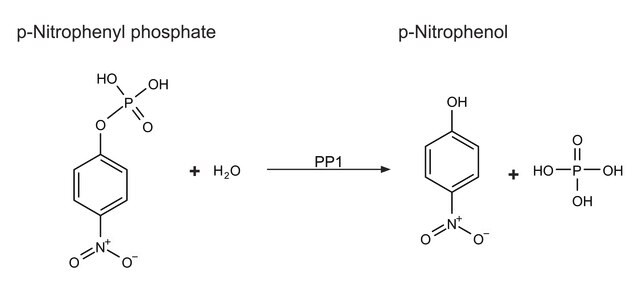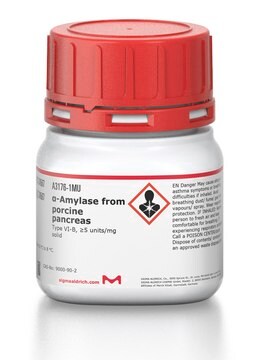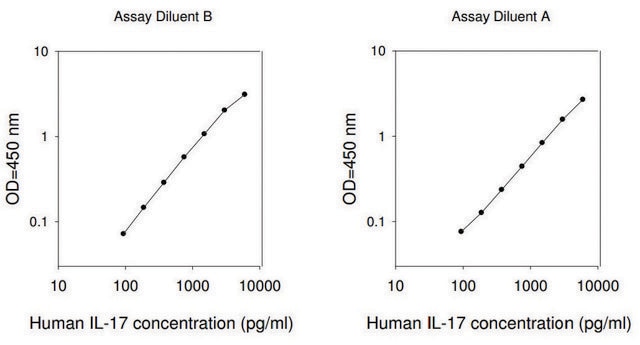P6244
Protein Tyrosine Phosphatase 1B human
recombinant, expressed in E. coli
Sinonimo/i:
PTP-1B
Autenticatiper visualizzare i prezzi riservati alla tua organizzazione & contrattuali
About This Item
Numero MDL:
Codice UNSPSC:
12352204
Prodotti consigliati
Ricombinante
expressed in E. coli
Livello qualitativo
Stato
solution
Attività specifica
≥20 units/mg protein
PM
37.4 kDa
Concentrazione
≥0.5 mg/mL
N° accesso UniProt
Malattie correlate
diabetes; obesity; cancer
Condizioni di spedizione
dry ice
Temperatura di conservazione
−70°C
Informazioni sul gene
human ... PTPN1(5770)
Cerchi prodotti simili? Visita Guida al confronto tra prodotti
Descrizione generale
Protein tyrosine phosphatase 1B human (PTP1B) is encoded by the gene PTPN1. In human chromosome, the gene PTPN1 is localized on 20q13.13. The protein has 37 kDa catalytic domain and the C-terminal hydrophobic residues targets the protein to the cytoplasmic side of the endoplasmic reticulum membrane.
Applicazioni
Protein Tyrosine Phosphatase 1B (PTP1B) human has been used in treating cell lysate prior to immunoprecipitation and protein pull-down studies. It has also been used in PTP1B activity assay and also for the evaluation of inhibitors like betulinic acid (BA) and sodium orthovanadate (Na3VO4), and 6-chloro-3-formyl-7-methylchromone (CFM) on PTP1B.
Protein tyrosine phosphatase 1B (PTP1B) is a pharmaceutical target used to study the treatment of various diseases such as obesity, cancer and type II diabetes mellitus.
The inhibitory effect of 8-(4-chlorophenylthio)-cAMP and 8-(4-chlorophenylthio)-cGMP on protein tyrosine phosphatase-1B has been assayed.
Azioni biochim/fisiol
PTP-1B is a recombinant, non-transmembrane protein expressed in E. coli containing amino acid residues 1-322 of human PTP-1B. It has a molecular mass of 37.4 kDa. It is an abundant intracellular enzyme that is thought to act as a negative regulator of certain signaling pathways. It dephosphorylates tyrosine-phosphorylated proteins and peptides, and is usually localized in the cytostolic domain of the ER.
PTP1B dephosphorylates c-Src in several human breast cancer cell lines has a regulatory role for PTP1B in the control of c-Src kinase activity. PTP1B is regulates the cardiovascular effects of leptin. PTP1B controls the JAK/STAT signaling pathway by dephosphorylation of JAK2.
Polymorphism in the gene PTPN1 is associated with type 2 diabetes and obesity.
Definizione di unità
One unit will hydrolyze 1.0 μmole of a phosphopeptide, EGFR fragment 988-998, per minute at pH 7.2 at 30 °C
Stato fisico
Supplied as a solution in 50 mM HEPES (pH 7.2), 1 mM EDTA, 5 mM DTT, and 0.05% NP-40
Codice della classe di stoccaggio
12 - Non Combustible Liquids
Classe di pericolosità dell'acqua (WGK)
WGK 1
Punto d’infiammabilità (°F)
Not applicable
Punto d’infiammabilità (°C)
Not applicable
Scegli una delle versioni più recenti:
Possiedi già questo prodotto?
I documenti relativi ai prodotti acquistati recentemente sono disponibili nell’Archivio dei documenti.
I clienti hanno visto anche
p66Shc couples mechanical signals to RhoA through FAK-dependent recruitment of p115-RhoGEF and GEF-H1
Wu RF, et al.
Molecular and Cellular Biology, MCB-00194 (2016)
A colorimetric biosensor based on guanidinium recognition for the assay of protein tyrosine phosphatase 1B and its inhibitors
Lv J, et al.
New. J. Chem., 41(23), 14414-14419 (2017)
Adsorption between TC-stabilized AuNPs and the phosphate group: application of the PTP1B activity assay
Lv J, et al.
Analyst, 140(23), 8017-8022 (2015)
Analysis of common PTPN1 gene variants in type 2 diabetes, obesity and associated phenotypes in the French population
Cheyssac C, et al.
BMC Medical Genetics, 7(1), 44-44 (2006)
p66Shc couples mechanical signals to RhoA through FAK-dependent recruitment of p115-RhoGEF and GEF-H1
Wu RF, et al.
Molecular and cellular biology, MCB-00194 (2016)
Il team dei nostri ricercatori vanta grande esperienza in tutte le aree della ricerca quali Life Science, scienza dei materiali, sintesi chimica, cromatografia, discipline analitiche, ecc..
Contatta l'Assistenza Tecnica.






